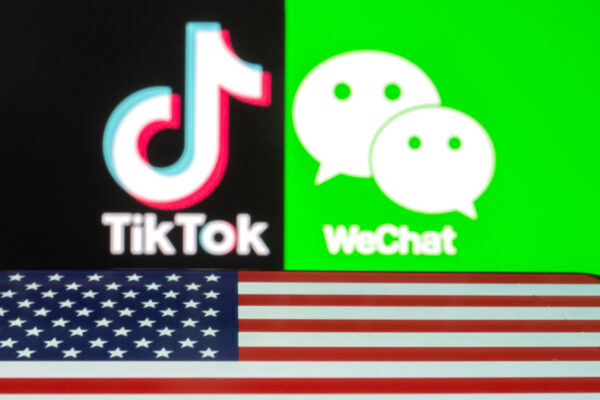Netizen Claims Chinese Police Have Special Surveillance WeChat Version
Distressed Patriotic Flag Unisex T-Shirt - Celebrate Comfort and Country $11.29 USD Get it here>>

A Chinese netizen claims that there is a police version of WeChat, a messaging app that’s widely used in China.
The app logo is blue, different from the typical green WeChat icon, and the blue version comes with a bonus: the user is also an administrator who can visit the records of connected users.
She said, “You don’t get any privacy with these Chinese apps.”
The netizen’s name was not revealed to protect her security.
‘It’s a Recording Device’
Jiu Jushui, an analyst of Chinese internet censorship, believes the WeChat app will allow Chinese police to use a backdoor and enjoy the convenience of access permission granted by the app.
“It’s a recording device on the go, whether you like it or not,” Jiu said.
WeChat, launched by Tencent, has been questioned more than once about the data security and privacy issue.
In 2017, Tencent Vice President Ding Ke said that Wechat would never read and store user chats. He said, “We are user-oriented. My chat log with my wife is not suitable for others to know, so I understand the feelings of my users.”
However, he also mentioned that Tencent will collect the data when chat logs or users are “under surveillance by the country.”

The regime has arrested dissidents based on the chat content provided by Tencent. Chat content was also presented as court evidence to finalize sentences.
Huang Qi, publisher of the human rights news website 64 Tianwang, was arrested in 2016 and received a 12-year sentence on accusations of “deliberately leaking state secrets,” and “illegally providing state secrets to foreign countries” in 2019.
In 2018 during the interrogation, Huang filed a lawsuit against Tencent and its founder Pony Ma for releasing his chat content to the police as evidence on his charge.
The Uncapped User’s Authorization
In a 2021 YouTube video, Sophia (pseudonym), a Chinese woman, said that her relative who lives outside China, was harassed by the Chinese police because of the content of a message he sent to China on WeChat. A reporter from the Chinese language edition of The Epoch Times interviewed her on July 4 to confirm the information on the video.
She said her cousin was attending a U.S. college, and in 2021, received a warning from the police about a chat he had with his mother in China in which he complained about how many people the Chinese Communist Party had killed.
The police threatened him saying that his WeChat account had provided the police details of his relatives inside China. The police also visited his mother’s home.
With the app, the police told him they could monitor him 24 hours a day, and connect to all users on his WeChat account.
The police revealed the records of his daily log, such as when he took a shower and how long it lasted. The phone would also automatically play rock versions of Communist Party songs when he was sleeping at night, even when the phone had been powered off.
When the much-troubled young man finally went to an iPhone store seeking help, the Chinese police immediately called him and asked what he intended to do there.
The iPhone store traced the line to a control center in the mountain area of Guizhou Province in southwest China.
Spies Inside the Spy Network
Commentator Wang He said to The Chinese language edition of The Epoch Times that many years ago, a director at the public security tracking department admitted to him that the telephones of cadres above the deputy director level were already tapped before the digital era.
“The so-called privileged are also the subjects of surveillance,” Wang said.
He indicated that for private enterprises such as WeChat, there are CCP spies inside the companies watching.
Li Xinan contributed to this report.





